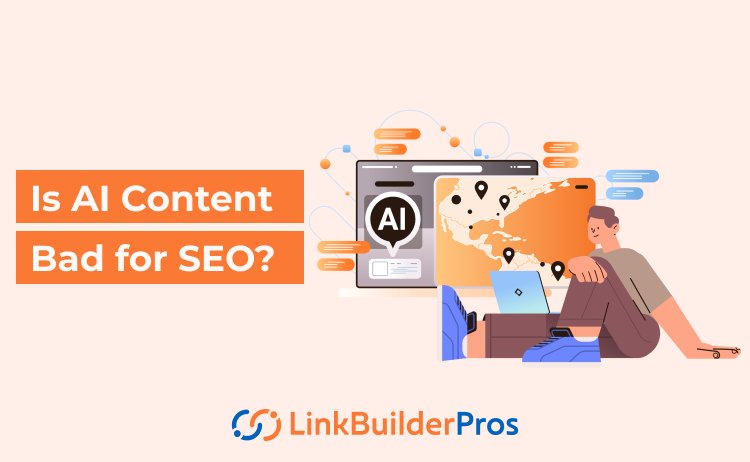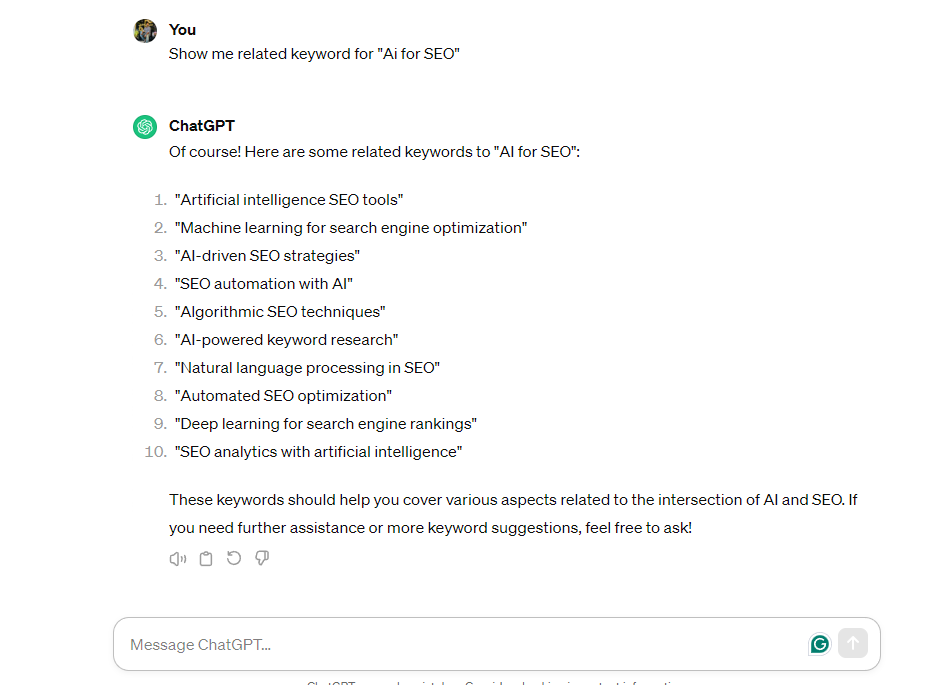Blogs
Practical Insights & Latest Happenings
Don’t miss out on the latest trends and info on SEO, search engines, social media, and more.
March 28, 2024
mothasim

Is AI content bad for SEO?
This is a matter of concern for so many website owners now because they are worried that this could impact their rankings.
The answer is simple: Google does not care if your content is human-or AI-generated. It only wants you to create relevant, useful, and valuable content that benefits the user in every way possible.
However, AI content creation tools are not so advanced yet. They cannot create in-depth and highly creative content that has a high engagement rate.
That means you should not rely too much on AI and whenever you resort to AI, you should thoroughly check and edit it.
In early 2023, Google released a guideline for AI-generated content for SEO. In this guideline, they cleared their stance on AI content.
Google wants websites to be very open about how they use AI content. If you’re using AI to generate content, you should notify Google.
They point out that AI-generated content should deliver unique value while neither misleading nor deceptive to users. Google plans to lower the ranking of AI content that they consider to be spam or low-quality.
Some key points about Google’s stance on AI-written content:
Google is not discriminating against AI-generated content itself. But it will continue penalizing any low-quality, deceptive, or manipulative content that violates its spam policies, regardless of whether humans or AI was involved.
Let’s discuss the critical aspects of Google’s guidelines on AI-generated content-
Google wants all content to be unique, reliable, helpful, and people-centric (you must have heard of Google EEAT). If AI creates content, it needs to be just as good in quality, originality, and accuracy as content made by humans.
The information provided must be valuable and unique to users. Companies creating AI content must prioritize producing high-quality, differentiated material aligning with Google’s standards.
Google wants transparency. If you generate content by using AI it must be clearly disclosed and attributed. Websites can not try to pass off AI output as purely human-created without transparency.
Any use of AI writing tools or language models must be clearly disclosed to users. This includes providing proper attribution that specifies which portions were AI-generated versus human-written.
Google wants to maintain trust with internet users. Google understands AI writing assistants are becoming more prevalent. However, they demand honest disclosure rather than attempting to make AI-generated text appear as organic human writing without clarity provided to users.
Google deeply cares about providing an excellent user experience. It wants to make sure people have a perfect time when they search for things online.
They want websites to be super helpful and not annoy people with too many ads, pop-ups, or other distractions. The main goal is to keep things simple and useful for everyone who uses Google to find information.
When you are using AI-generated content, It’s important to be very honest with Google. Don’t try to trick Google or people. This means you shouldn’t use AI content to cheat your way to the top of search results, lie to readers, or do anything sneaky to improve your website’s visibility.
Always focus on creating helpful and truthful content that genuinely benefits your audience. If you provide valuable and authentic content, you build trust with your audience and ensure that your website provides real value to users seeking information online.
Remember, the ultimate goal is to offer content that genuinely benefits and engages your audience.
When you are using AI-generated content, It’s crucial to follow not only Google’s guidelines but also other ethical standards. This means you have to make sure that the content created by AI doesn’t break any copyright laws, promote hate speech, or cause harm online.
It’s important to check and verify the AI-generated content to ensure it meets legal and ethical requirements. By doing this, you can avoid any issues related to copyright infringement, spreading harmful messages, or violating online regulations.
Google always focuses on high-quality content. If your content is original and informative enough, Google doesn’t ban or penalize your website just because it’s AI-generated content.
But this type of content can impact your SEO differently based on how well it aligns with Google’s quality standards. When it comes to creating content for Google, the key is to create content that satisfies the reader.
Google accepts the use of AI-generated content if it’s done ethically. But it can harm your SEO rankings if it doesn’t meet Google’s E-E-A-T (expertise, experience, authoritativeness, trustworthiness) criteria. This means that the content should be helpful, trustworthy, and relevant to users.
Here’s where AI content for SEO can fail to meet Google’s expectations-
Let’s now talk about how you can use AI correctly to generate content for SEO. To use AI-generated content, you can follow these steps-
The first step is to find the perfect keyword. Words and phrases that people commonly use when searching for things related to your business or industry. Identifying these popular “keywords” is most important.
But it’s not enough to just know the keywords – you also need to understand the true intent behind those searches. What are users actually trying to find or accomplish when they type in those words? Getting inside the mind of your audience is key.
For example, if the keyword is “best-running shoes,” some users may want to simply read reviews and compare options. But others may be ready to go straight to purchase. Recognizing the different underlying intents for the same keyword search is important.
Once you clearly understand both the common keywords and the specific goals of the users entering those searches, you can start optimizing your content strategy effectively. Meeting user needs is the ultimate goal.

First, you need to choose an AI software that can automatically write content for you. There are many different AI writer tools available – the most popular being OpenAI’s ChatGPT.
Think about what kind of content you need – blog posts, product descriptions, emails, and more. And consider your writing style preferences – formal, casual, or long-form.
Once you know what you’re looking for, research the various AI content generator options. Read reviews and see which tool’s capabilities best fit your specific needs and goals.
When you find an AI content writing tool you want to try, simply provide it with the target keywords or topics you need content about. You can also input things like your desired word count range and your preferred tone of voice.
With those details supplied, the AI tool will then automatically generate a first draft of content tailored to your inputs. Just like that, the AI gives you a head start on your writing project.
Once the AI tool has finished creating the content, take the time to read through it yourself.
Check that it is easy to understand, relevant to what you want to talk about, and includes key SEO elements like meta descriptions.
This step is crucial to ensure the content is of high quality and aligns with your website’s goals before you decide to publish it for your audience to see.
When you are happy with the content you have created using the AI tool, you can put it on your website or blog.
This will help make your website more visible online and improve how easily people can find you through search engines. By sharing this content, you can boost your SEO efforts and attract more visitors to your site.
In the future, AI will change how we make and enjoy content. AI tools are already making it easier to create interesting and personalized content. As AI gets better, it will help us make content more efficiently and effectively.
This means that businesses and individuals will be able to create more creative content, tailored to specific audiences, and produce faster. Overall, AI in content creation will bring a new level of creativity, personalization, and efficiency to how we develop content in the digital age.